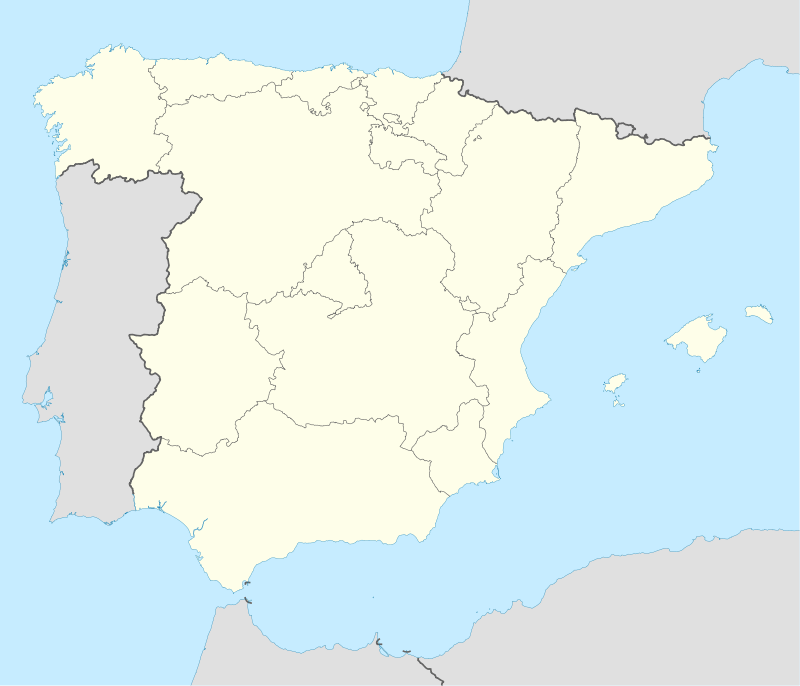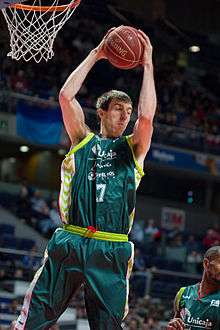Liga ACB
|
Current season, competition or edition: | |
|
Logo ACB | |
| Formerly |
Liga Nacional (1957–1983) ACB Primera División (1983–1988) |
|---|---|
| Sport | Basketball |
| Founded |
1957 (as Liga Nacional) |
| Inaugural season | 1983–84 |
| CEO | Francisco Roca Pérez |
| No. of teams | 18 |
| Country |
|
| Continent |
|
| Most recent champion(s) | Real Madrid (33rd title) |
| Most titles | Real Madrid (33 titles) |
| TV partner(s) |
Teledeporte (TVE) (best match per week, free) Canal+ Deportes (Movistar+) (Rest of the matches live) |
| Level on pyramid | 1st tier |
| Relegation to | LEB Oro |
| Domestic cup(s) |
Spanish King's Cup Spanish Supercup |
| International cup(s) |
EuroLeague (1st tier) EuroCup (2nd tier) Champions League (3rd tier) |
| Official website | ACB.com (Spanish) |
The Liga ACB[N 1] (English: ACB League), known as the Liga Endesa[N 2] (English: Endesa League) for sponsorship reasons, is the first tier level professional men's basketball league in Spain. It began in 1957, with the name of Liga Nacional, and was originally organized by the Spanish Basketball Federation. The league changed to its current form, beginning with the 1983–84 season, after the Asociación de Clubs de Baloncesto (ACB) took control over the league. The league is rated as one of the top three European national domestic/regional leagues in the European national basketball league rankings system.
The ACB League, which is played under FIBA rules, currently consists of 18 teams, of which the most successful have been Real Madrid and FC Barcelona Regal.
Competition format

Each team has to play all the other teams in its division twice, once at home and once away. This means that in Liga ACB the league's regular season ends after all teams play 34 matches.
At the end of the league, the eight best teams in the standings start a play-off, pitting the first place team in the standings versus the 8th place team in the standings, and so on. There are three playoff rounds, each consisting of five game series, and the winner of the finals round becomes the champion of the Liga ACB. This is similar to the NBA playoffs system, but shorter.
Each season, the two last qualified teams of the regular season are relegated to LEB Oro and replaced by the two first qualified teams of this league.
Controversies about promotion to Liga ACB
Until 2012, in the 29 editions played of the Liga ACB only three teams resigned to promote due to acting as reserve teams or lack of funds. These three teams were CB Guadalajara and CB Cornellà in 1993 and CB Cajabilbao in 1994.
Since 2012, due to the financial crisis that started in 2008, only two teams (Canarias and Andorra) of the possible eight could promote to Liga ACB. This fact started a discussion about the requirements of the ACB in order to promote, considered by the LEB Oro clubs as "disproportionate".[1]
For clubs that promote and would make their debut in the ACB demands:[2]
- An arena with a minimum capacity of 5,000 seats.
- An inbound of €3m. For clubs that come back to the league after a promotion, an update of the inbound is demanded.
- A deposit of €1,7m that would be returned in case of relegation to LEB Oro. In case of a new promotion, this deposit is required to be restored.
- The conversion into a Sociedad Anónima Deportiva if the club remains in Liga ACB after its first season.
In 2012, Iberostar Canarias and Menorca Bàsquet achieved the promotion to ACB, but neither could fulfill the requirements in order to promote.[3] However, Canarias finally played in ACB after buying the berth in the league of Lucentum Alicante, previously sold to the association.[4]
In 2013, neither CB Atapuerca, Ford Burgos by sponsorship reasons, nor Lucentum Alicante could promote. The seconds resigned also to play in the second league and joined the fifth division.
In 2014 and 2015, CB Tizona, also Ford Burgos by sponsorship reasons, did not promote despite achieving the place two years in a row. After its second failed promotion, the third in the city of Burgos, the club sued the Association[1] and this one accused them of "distorting the reality".[5] Also in 2015, despite having played in the league during the 1980s and 1990s, Club Ourense Baloncesto was not admitted in the league despite fulfilling all the requirements after not passing an accounts audit.[6] However, ACB would admit Ourense for the 2016–17 season if it fulfill the requirements regardless of their position in the 2015–16 LEB Oro season.[7]
On 24 April 2016, the National Commission of the Markets and the Competence argued that the inboud impedes in an "unjustified, disproportionate and discriminatory" way the access of new clubs to Liga ACB.[8]
On June 2016, the two promoted teams from LEB Oro (Palencia and Melilla) resigned to promote to the 2016–17 ACB season and requested to the ACB their sign in before the 2017–18 season. However, as Gipuzkoa Basket, who finished in relegation positions in three of the last four seasons, resigned to play in ACB,[9] the Association offered again its place to Palencia and Melilla.[10] Palencia refused the invitation to reinforce their position against the inbound to play in the league.[11]
History
- 1957 to 1982–83 Liga Nacional
- 1983–84 to 1987–88 ACB Primera División
- 1988 to present Liga ACB
Title holders
Total titles by Club (Liga Nacional & ACB)
| Club | W | R | Winning years |
|---|---|---|---|
| Real Madrid | 33 | 11 | 1957, 1958, 1960, 1961, 1962, 1963, 1964, 1965, 1966, 1968, 1969, 1970, 1971, 1972, 1973, 1974, 1975, 1976, 1977, 1979, 1980, 1982, 1984, 1985, 1986, 1993, 1994, 2000, 2005, 2007, 2013, 2015, 2016 |
| FC Barcelona | 18 | 20 | 1959, 1981, 1983, 1987, 1988, 1989, 1990, 1995, 1996, 1997, 1999, 2001, 2003, 2004, 2009, 2011, 2012, 2014 |
| Joventut Badalona | 4 | 10 | 1967, 1978, 1991, 1992 |
| Baskonia | 3 | 4 | 2002, 2008, 2010 |
| Málaga | 1 | 2 | 2006 |
| Manresa | 1 | 0 | 1998 |
| Picadero | 0 | 4 | |
| Estudiantes | 0 | 4 | |
| Sevilla | 0 | 2 | |
| Orillo Verde | 0 | 1 | |
| Valencia | 0 | 1 | |
| Bilbao | 0 | 1 |
ACB Finals
| Team | Total | W | L |
|---|---|---|---|
| FC Barcelona | 26 | 15 | 11 |
| Real Madrid | 18 | 11 | 7 |
| Baskonia | 7 | 3 | 4 |
| Joventut Badalona | 6 | 2 | 4 |
| Málaga | 3 | 1 | 2 |
| Sevilla | 2 | 0 | 2 |
| Manresa | 1 | 1 | 0 |
| Valencia | 1 | 0 | 1 |
| Estudiantes | 1 | 0 | 1 |
| Bilbao | 1 | 0 | 1 |
Current clubs

All-time Liga ACB table
The All-time Liga ACB table is an overall record of all match results of every team that has played in Liga ACB since the 1983–84 season. The table is accurate as of the end of the 2015–16 season.
| Pos | Team | Season | Played | Won | Lost | 1st | 2nd | 3rd | 4th | QF | Debut | Since/Last App | Best |
|---|---|---|---|---|---|---|---|---|---|---|---|---|---|
| 1 | Barcelona | 33 | 1406 | 1057 | 349 | 15 | 11 | 4 | 1 | 2 | 1983–84 | 1983–84 | 1 |
| 2 | Real Madrid | 33 | 1366 | 1004 | 362 | 11 | 7 | 6 | 2 | 6 | 1983–84 | 1983–84 | 1 |
| 3 | Baskonia | 33 | 1289 | 808 | 481 | 3 | 4 | 4 | 5 | 12 | 1983–84 | 1983–84 | 1 |
| 4 | Joventut | 33 | 1245 | 729 | 516 | 2 | 4 | 5 | 4 | 6 | 1983–84 | 1983–84 | 1 |
| 5 | Estudiantes | 33 | 1244 | 666 | 578 | – | 1 | 5 | 7 | 9 | 1983–84 | 1983–84 | 2 |
| 6 | Málaga[N 3] | 31 | 1189 | 673 | 516 | 1 | 2 | 4 | 5 | 9 | 1983–84 | 1987–88 | 1 |
| 7 | Valencia | 27 | 1024 | 581 | 443 | – | 1 | 2 | 2 | 12 | 1988–89 | 1996–97 | 2 |
| 8 | Sevilla | 27 | 978 | 457 | 521 | – | 2 | – | – | 6 | 1989–90 | 1989–90 | 2 |
| 9 | Manresa | 29 | 1038 | 440 | 598 | 1 | – | – | 2 | 2 | 1983–84 | 2007–08 | 1 |
| 10 | Gran Canaria | 25 | 917 | 433 | 484 | – | – | – | 1 | 12 | 1985–86 | 1995–96 | 4 |
| 11 | Valladolid | 30 | 1032 | 432 | 600 | – | – | – | – | 4 | 1983–84 | 2013–14 | 6 |
| 12 | Girona | 20 | 731 | 330 | 401 | – | – | – | – | 4 | 1988–89 | 2007–08 | 5 |
| 13 | Zaragoza | 13 | 473 | 270 | 203 | – | – | 2 | 3 | 6 | 1983–84 | 1995–96 | 3 |
| 14 | Fuenlabrada | 18 | 626 | 249 | 377 | – | – | – | – | 5 | 1996–97 | 2005–06 | 7 |
| 15 | Breogán | 16 | 604 | 242 | 362 | – | – | – | – | 2 | 1984–85 | 2005–06 | 6 |
| 16 | Murcia | 18 | 639 | 218 | 421 | – | – | – | – | 1 | 1990–91 | 2011–12 | 7 |
| 17 | Bilbao | 11 | 427 | 206 | 221 | – | 1 | – | – | 5 | 2004–05 | 2004–05 | 2 |
| 18 | León | 11 | 398 | 179 | 219 | – | – | – | – | 3 | 1990–91 | 2007–08 | 6 |
| 19 | Peñas | 12 | 441 | 173 | 268 | – | – | – | – | – | 1983–84 | 1995–96 | 10 |
| 20 | Granollers | 10 | 352 | 166 | 186 | – | – | – | – | 7 | 1983–84 | 1992–93 | 5 |
| 21 | Cáceres | 11 | 388 | 163 | 225 | – | – | – | – | 1 | 1992–93 | 2002–03 | 5 |
| 22 | Canarias[N 4] | 11 | 385 | 157 | 228 | – | – | – | – | 2 | 1983–84 | 2012–13 | 6 |
| 23 | Ourense | 12 | 383 | 143 | 240 | – | – | – | – | 2 | 1989–90 | 2000–01 | 8 |
| 24 | OAR Ferrol | 10 | 350 | 140 | 210 | – | – | – | – | 1 | 1983–84 | 1993–94 | 7 |
| 25 | Granada | 12 | 411 | 140 | 271 | – | – | – | – | – | 1996–97 | 2010–11 | 10 |
| 26 | Lucentum | 9 | 316 | 132 | 184 | – | – | – | – | 3 | 2000–01 | 2011–12 | 6 |
| 27 | Zaragoza 2002 | 7 | 244 | 112 | 132 | – | – | 1 | – | 1 | 2008–09 | 2010–11 | 3 |
| 28 | Gipuzkoa | 9 | 307 | 105 | 202 | – | – | – | – | 1 | 2006–07 | 2008–09 | 5 |
| 29 | Collado Villalba | 5 | 226 | 93 | 133 | – | – | – | – | 1 | 1987–88 | 1991–92 | 8 |
| 30 | Andorra | 6 | 215 | 90 | 125 | – | – | – | – | 1 | 1992–93 | 2014–15 | 8 |
| 31 | Oximesa | 6 | 225 | 82 | 143 | – | – | – | – | – | 1986–87 | 1991–92 | 11 |
| 32 | Obradoiro | 6 | 206 | 77 | 130 | – | – | – | – | 1 | 2009–10 | 2011–12 | 8 |
| 33 | Maristas Málaga | 4 | 160 | 76 | 84 | – | – | – | – | – | 1988–89 | 1991–92 | 13 |
| 34 | Cajabilbao | 5 | 184 | 76 | 108 | – | – | – | – | – | 1986–87 | 1990–91 | 9 |
| 35 | Espanyol | 5 | 165 | 73 | 92 | – | – | – | – | 1 | 1984–85 | 1988–89 | 8 |
| 36 | Lleida | 4 | 140 | 57 | 83 | – | – | – | – | 1 | 2001–02 | 2004–05 | 8 |
| 37 | Cantabria | 5 | 170 | 53 | 117 | – | – | – | – | – | 1997–98 | 2001–02 | 14 |
| 38 | Menorca | 5 | 168 | 51 | 117 | – | – | – | – | – | 2005–06 | 2011–12 | 15 |
| 39 | Círculo Católico | 3 | 97 | 49 | 48 | – | – | – | 1 | 1 | 1983–84 | 1985–86 | 4 |
| 40 | Cajamadrid | 3 | 98 | 46 | 52 | – | – | – | – | 1 | 1983–84 | 1985–86 | 5 |
| 41 | Gijón | 4 | 144 | 37 | 107 | – | – | – | – | – | 1995–96 | 2001–02 | 15 |
| 42 | Salamanca | 2 | 76 | 36 | 40 | – | – | – | – | – | 1994–95 | 1995–96 | 9 |
| 43 | Tenerife AB | 2 | 89 | 28 | 61 | – | – | – | – | – | 1988–89 | 1989–90 | 22 |
| 44 | Llíria | 2 | 79 | 27 | 52 | – | – | – | – | – | 1991–92 | 1992–93 | 16 |
| 45 | Tenerife | 2 | 68 | 25 | 43 | – | – | – | – | – | 2003–04 | 2004–05 | 10 |
| 46 | L'Hospitalet | 1 | 31 | 11 | 20 | – | – | – | – | – | 1983–84 | 1983–84 | 15 |
| 47 | Ciudad de Huelva | 1 | 39 | 11 | 28 | – | – | – | – | – | 1997–98 | 1997–98 | 17 |
| 48 | Askatuak | 1 | 43 | 10 | 33 | – | – | – | – | – | 1988–89 | 1988–89 | 24 |
League or status at 2015–16 season:
| 2015–16 ACB season | |
| 2015–16 LEB Oro season | |
| 2015–16 LEB Plata season | |
| 2015–16 Liga EBA season | |
| Lower divisions | |
| Clubs that no longer exist or does not compete in senior competitions |
Awards
- ACB Most Valuable Player Award
- ACB Finals Most Valuable Player Award
- ACB Best Young Player Award
- All-ACB Team
- ACB Player of the Month Award
- ACB Best Coach
- AEEB Coach of the Year
- ACB contests
ACB statistical leadersMain article: ACB statistical leaders
Liga ACB all-time scoring leaders[30] Stats through the end of the 2015–16 Liga ACB season:
Liga ACB all-time rebounding leaders[31] Stats through the end of the 2015–16 Liga ACB season:
ACB records Fran Vázquez holds the record for most blocks in an ACB game, 12
Spanish clubs in European competitions
Other competitionsNotesReferences
External links | ||||||||||||||||||||||||||||||||||||||||||||||||||||||||||||||||||||||||||||||||||||||||||||||||||||||||||||||||||||||||||||||||||||||||||||||||||||||||||||||||||||||||||||||||||||||||||||||||||||||||||||||||||||||||||||||||||||||||||||||||||||||||||||||||||||||||||||||||||||||||||||||||||||||||||||||||||||||||||||||||||||||||||||||||||||||||||||||||||||||||||||||||||||||||||||||||||||||||||||||||||||||||||||||||||||||||||||||||||||||||||||||||||||||||||||||||||||||||||||||||||||||||||||||||||||||||||||||||||


